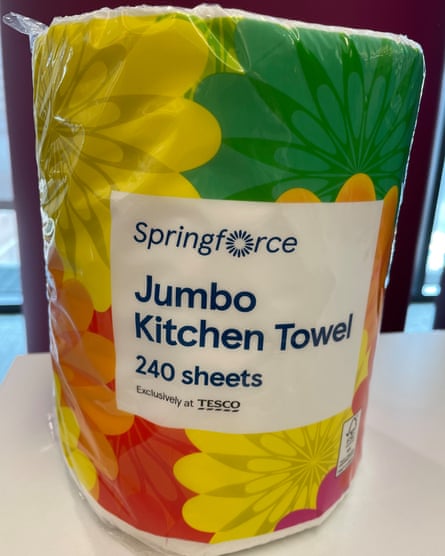
Have you recently had the impression that the tissues you normally buy are smaller than they were? Or that the guacamole you usually throw in your trolley isn’t quite as tasty as it used to be? Or that your favourite tomato pesto is a bit less tomatoey? You are probably spot-on.
Shoppers, who have already had to contend with rising prices and shrinking pack sizes, now also have to look out for “skimpflation” – the quiet downgrading in specification of some products.
As the cost of ingredients soars, supermarkets and manufacturers have been quietly changing recipes and reducing the size of some products to keep shelf prices down.
Where the big brands go, the supermarkets tend to follow, and some retailers have more than halved the amount of olive oil in spreads and cut how much they use in sauces without highlighting a change in recipe. Meanwhile, the rising cost of paper has led others to reduce the size of individual tissues and kitchen roll sheets.
In some cases there is nothing on the packet to indicate that anything has changed, so consumers are not aware they are getting less for their money until they get home.
Guardian Money began looking at products after being approached by a reader who had noticed that the Aldi spread he had bought contained only 10% olive oil when previously it was 21%.
Other examples found by the Guardian include:
Morrisons Guacamole The ingredients used to include 80% avocado and 5% red onion but now show 77% avocado and an unspecified amount of onion.
Aldi Specially Selected Pesto Rosso 190g This used to contain 33% extra virgin olive oil and 26% rehydrated sun-dried tomatoes; now it is 27% extra virgin olive oil and 23% rehydrated sun-dried tomatoes.
Tesco Soft Extra Large Tissues These had been 300mm x 260mm but measured 280mm x 235mm in Guardian Money’s test.
Tesco Springforce Jumbo Kitchen Towel Sheets used to be 210mm x 210mm but are now 195mm x 200mm, according to our test.
Aldi Bramwells Real Mayonnaise It used to list 9% egg yolk but now lists 6% egg and 1.5% egg yolk.
Bertolli, Morrisons and Sainsbury’s olive oil spreads In these spreads, too, 21% olive oil has been reduced to 10%.
Some of the changes are small but they all involve the reduction of key, and expensive, ingredients, and some came alongside price rises or cuts to pack sizes. Morrisons, for example, cut the olive oil content in its spread and reduced packs from 500g to 450g.
In some of these cases, retailers have stopped publishing details that made it possible to compare products before buying. On Tesco’s website, for example, information about the size of individual tissues has been removed.
 View image in fullscreenTesco reduced the sheet size of its Springforce Jumbo Kitchen Towel.
View image in fullscreenTesco reduced the sheet size of its Springforce Jumbo Kitchen Towel.
Customers have picked up on some of the changes – but only after buying the product. On the Sainsbury’s website, one customer reviewing its own-brand olive oil spread wrote: “This used to have 21% olive oil in it which, with its cheaper price than the popular brand, made it a good alternative. Now the recipe only has 10%. Profit first.”
On Tesco’s website, one shopper complains: “These tissues have changed. They are now nothing like the description. They are not luxury, soft, gentle and definitely NOT extra-large. Very inferior.”
The crisis in Ukraine and drought across Europe have pushed up the price of all kinds of cooking oil, leading to adjustments in recipes that use it. This week’s inflation figures showed the price of olive oil to consumers is up by 44.8% year on year. Paper pulp prices had been rising; however, recently, falling demand has pushed them lower again.
 View image in fullscreenTesco said it had changed the size of its jumbo kitchen towel so that it could fit more of them on lorries. Photograph: Joe Giddens/PA
View image in fullscreenTesco said it had changed the size of its jumbo kitchen towel so that it could fit more of them on lorries. Photograph: Joe Giddens/PA
Sue Davies, the head of food policy at the consumer group Which?, said it was worrying that people could be “inadvertently paying more for less”.
She added: “While shoppers may be deterred from buying a product if they can see the packet getting smaller or the prices going up, they are less likely to notice manufacturers and supermarkets quietly changing the ingredients of products.
“If you are concerned about the ingredients of your favourite items, be sure to check the label carefully when shopping and compare with other brands of the same product to make sure you’re getting the best possible deal.”
Tesco said that reductions in the size of its Springforce kitchen roll had come alongside an increase in the number of sheets and were designed to reduce costs.
A Tesco spokesperson said: “With household budgets under continued pressure, we have been working to mitigate the impact of inflation as much as we can for our customers.
“Following a sharp rise in wood pulp and energy costs last year, we reduced the height of our Springforce Jumbo Kitchen Towel rolls but increased the number of sheets from 220 to 240, enabling us to stack more rolls in each lorry and reduce our transportation costs, so that we could continue to offer our customers great value.”
A Sainsbury’s spokesperson said: “We regularly review and reformulate our products for reasons including improving health credentials, cost-saving and responding to feedback.”
A spokesperson for Aldi said that the retailer was “offering products that match the quality of leading brands”.
Walter Zanre, the head of the olive oil producer Filippo Berio UK, said his company had seen demand from manufacturers fall as a result of changing recipes.
He also expects “fundamental shifts will happen” in the future, meaning more downgrading of products, as it can take up to nine months for recipes to be adapted and approved by retailers.
Additional reporting by Sarah Butler

